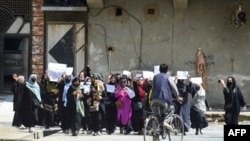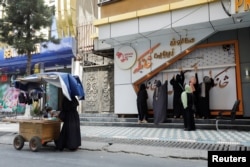Afghanistan’s Taliban government has told the United Nations that it will consider religious values and refuse outside interference in the country’s internal affairs when dealing with the world.
The statement was submitted to the U.N. this week in response to a Security Council-commissioned assessment that included recommendations for an international approach to dealing with crisis-hit Afghanistan under de facto Taliban rule.
The independent assessment, written by Turkish diplomat Feridun Sinirlioglu in his role as a special U.N. coordinator, mainly stemmed from the Taliban's demand for the world to recognize them as Afghanistan’s legitimate governing authority.
The report linked the issue of granting legitimacy to the Taliban – and giving them Afghanistan’s seat at the U.N. -- to their compliance with the country’s international treaty obligations that would require them to remove restrictions on women's rights to education and employment opportunities.
In its response, the Taliban-led Afghan foreign ministry rejected any such link. “This government is obligated to take into consideration the religious values and national interests of the country during all engagements and will not allow anyone to interfere in our internal affairs,” it said.
Since reclaiming power two years ago, the Taliban have barred girls from attending schools beyond the sixth grade across Afghanistan. They have stopped most Afghan female staff from working at government offices and aid agencies, including the United Nations.
Authorities have also closed beauty salons, and women are not allowed to visit parks and undertake road trips unless accompanied by a male guardian.
The Taliban refuse to ease curbs on women and insist their governance is aligned with local culture and Islamic law – assertions that many Afghan critics and the rest of the Muslim-majority countries dispute.
The U.N.-mandated assessment repeatedly underscored the importance of giving Afghan women the freedom to play a role in the conflict-torn country’s development.
"Any formal re-integration of Afghanistan into global institutions and systems will require the participation and leadership of Afghan women," read the assessment, submitted to the Security Council this month.
It also recommended that a national dialogue among all Afghan stakeholders, including those outside the country, be initiated to establish inclusive governance and ensure sustainable peace and economic development in the country after 45 years of armed conflict.
The report argued that the dialogue would permit movement toward the full normalization and integration of Afghanistan within the international system.
The Taliban welcomed some U.N. recommendations, such as helping the country strengthen its economy and encouraging regional connectivity via Afghanistan. However, they dismissed the idea of an intra-Afghan dialogue and skepticism about the ability of the current government to tackle the country’s security, economic, and humanitarian challenges.
“Afghanistan currently possesses a strong central government that represents the unique diversity of Afghans; therefore, it should not be viewed as a conflict zone where foreign-imposed political solutions like intra-Afghan dialogue are deemed necessary, and neither should the time of the international community be wasted with such endeavors,” the Taliban asserted in their response.
It also rejected as “unacceptable” a recommendation for a U.N. special envoy on Afghanistan.
The Taliban said Afghan women have secured some of their most basic rights, noting that 23.4% of all civil servants are female and unprecedented numbers of women participate as leaders and job creators in the business, commerce, and manufacturing sectors.
“The Islamic Emirate has collected thousands of street beggars – a legacy of the previous regime – a majority of whom were women, and allocated them regular stipends,” the Taliban statement said, using the official title for its administration.
It took credit for improving security across Afghanistan and eliminating opium cultivation. “Despite unilateral, malicious, and illegal sanctions, not only has the Islamic Emirate rescued the national economy from a total collapse but it has also launched large infrastructure projects,” read the Taliban response.
The U.N. says a dire humanitarian crisis, stemming from years of war and natural disasters has worsened since the Taliban takeover in August 2021, noting that two-thirds of the country’s estimated 43 million people need aid.
Some information in this report came from Reuters.






